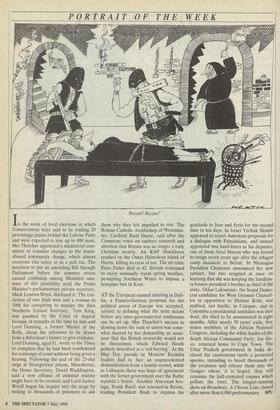PORTRAIT OF THE WEEK
Recant! Recant!' In the week of local elections in which Conservatives were said to be trailing 20 percentage points behind the Labour Party and were expected to lose up to 400 seats, Mrs Thatcher appointed a ministerial com- mittee to consider changes to the much- abused community charge, which almost everyone else refers to as a poll tax. The intention to put an amending Bill through Parliament before the summer recess caused confusion among Ministers una- ware of this possibility until the Prime Minister's parliamentary private secretary, Mark Lennox-Boyd, disclosed it. The con- viction of two Irish men and a woman in 1988 for conspiring to murder the then Northern Ireland Secretary, Tom King, was quashed by the Court of Appeal because of remarks at the time by him and Lord Denning, a former Master of the Rolls, about the inference to be drawn from a defendant's failure to give evidence. Lord Denning, aged 91, wrote to the Times to complain that he had been condemned for contempt of court without being given a hearing. Following the end of the 25-day siege at Strangeways prison, Manchester, the Home Secretary, David Waddington, said a new offence of criminal mutiny might have to be created; and Lord Justice Woolf began his inquiry into the siege by writing to thousands of prisoners to ask them why they felt impelled to riot. The Roman Catholic Archbishop of Westmins- ter, Cardinal Basil Hume, said after the Commons votes on embryo research and abortion that Britain was no longer a truly Christian society. An RAF Shackleton crashed on the Outer Hebridean island of Harris, killing its crew of ten. The art critic Peter Fuller died at 42. Britain continued to enjoy unusually warm spring weather, prompting Southern Water to impose a hosepipe ban in Kent.
AT the European summit meeting in Dub- lin, a Franco-German proposal for the political union of Europe was accepted, subject to defining what the term means before any inter-governmental conference can be set up. Mrs Thatcher's success in slowing down the rush to union was some- what marred by her demanding an assur- ance that the British monarchy would not be threatened, which Edward Heath politely described as a 'red herring'. At the May Day parade in Moscow Kremlin leaders had to face an unprecedented demonstration from a hostile crowd; while in Lithuania there was hope of agreement with the Soviet government over the Baltic republic's future. Another American hos- tage, Frank Reed, was released in Beirut, leading President Bush to express his gratitude to Iran and Syria for the second time in ten days. In Israel Yitzhak Shamir appeared to reject American proposals for a dialogue with Palestinians, and instead appointed two hard-liners as his deputies, one of them Ariel Sharon who was forced to resign seven years ago after the refugee camp massacre in Beirut. In Nicaragua President Chamorro announced her new cabinet, but two resigned at once on learning that she was keeping the Sandinis- ta former president's brother as chief of the army. Oskar Lafontaine, the Social Demo- crat candidate for West German Chancel- lor in opposition to Helmut Kohl, was stabbed, not fatally, in Cologne; and in Colombia a presidential candidate was shot dead, the third to be assassinated in eight months. After nearly 30 years' exile, five senior members of the African National Congress, including the white leader of the South African Communist Party, Joe Slo- vo, returned home to Cape Town. The Uttar Pradesh government in India de- clared the carnivorous turtle a protected species, intending to breed thousands of the creatures and release them into the Ganges where, it is hoped, they will consume the half-cremated corpses which pollute the river. The longest-running show on Broadway, A Chorus Line, closed after more than 6,000 performances. SPC


















































 Previous page
Previous page